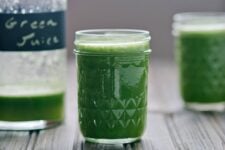Blueberries are a popular fruit enjoyed around the world for their delicious flavor, rich color, and superfood qualities. They are incredibly dense in antioxidants and nutrients and have been linked with numerous health benefits.
Blueberries may play a role in chronic disease prevention, from heart health to cognitive function. The best part is they are available year-round in fresh and frozen forms and are easy to add to your diet!

There are two primary varieties of blueberries. Highbush blueberries are the larger, more common variety found at grocery stores in North America. Lowbush blueberries (also known as wild blueberries) are smaller in size with greater antioxidant capacity.
Learn more about the nutritional qualities and top health effects of blueberries below.
Blueberry Nutrition
According to the USDA database, one cup of blueberries (148 grams) provides (1):
- Calories: 84
- Protein: 1 g
- Fat: 0.5 g
- Carbohydrate: 21 g
- Dietary fiber: 3.6 g
Top 10 Health Benefits of Blueberries
Blueberries can improve your health in many ways– they may help prevent chronic illnesses like diabetes, cancer, and high blood pressure while benefiting heart, eye, liver, and brain health.
1. Nutrient-Dense and Low Calorie
Blueberries are a low-calorie food, with just 84 calories in 1 cup and 57 calories per 100 grams. They contain numerous vitamins and minerals, like vitamin C, vitamin K, and manganese (1).
They are rich in antioxidants and phytochemicals, beneficial plant compounds that help fight systemic inflammation. One of the top antioxidants in blueberries is called anthocyanin and is responsible for the deep blue color (2).
2. May Reduce The Risk of Heart Disease
Diets rich in anthocyanins are associated with a 25% lower risk of developing heart disease. Studies show this is primarily because the people who eat more anthocyanin-rich foods, like blueberries, tend to have lower rates of heart attacks (2).
3. May Prevent Prediabetes and Type 2 Diabetes
Research shows that eating at least two servings of blueberries each week can reduce the risk of developing prediabetes and type 2 diabetes by over 20% (2). For reference, a serving of blueberries is equal to half a cup.
Studies have found that this risk reduction occurs because the antioxidant levels in blueberries can improve insulin sensitivity and blood sugar levels and decrease markers of inflammation (2).
4. Boost Brain Function
Eating blueberries is linked with better brain health. A diet rich in blueberries may delay cognitive decline in older adults by two and a half years (2).
Supplementing the diet with blueberries may also help with memory in people with mild cognitive impairment. Studies have even shown benefits on cognitive performance in children who eat blueberries (2).
In addition, the anthocyanin content of blueberries has been linked with a lower risk of Parkinson’s disease and possibly a reduced chance of developing Alzheimer’s disease and other types of dementia (2).
5. May Improve Vision
Blueberry intake may play a role in vision and eye health. A diet containing blueberries is associated with a lower risk of age-related macular degeneration (2).
Studies on anthocyanin, one of the antioxidants in blueberries, have shown that it can help improve vision in people with glaucoma and diabetic retinopathy (2).
6. May Lower Blood Pressure
The antioxidant content of blueberries may also help prevent high blood pressure. Multiple studies have found that a diet rich in anthocyanins reduces the risk of hypertension by up to 10%, especially in women over 60 years old (2).
Eating blueberries has been shown to lower systolic and diastolic blood pressure by up to 6% in people with existing high blood pressure. Anthocyanins may also help reduce the stiffness of blood vessels (2).
7. May Reduce Cholesterol
One study found that adding blueberries to the diet resulted in lower LDL cholesterol and triglyceride levels. It also caused an increase in HDL cholesterol, known as the “good” cholesterol (2).
The anthocyanins in blueberries are also known to decrease inflammation levels in people with high cholesterol (2).
8. May Protect Against Cancer
Research shows that the anthocyanins and phenolic acids present in blueberries may play a role in preventing and slowing cancer growth. These powerful antioxidants have also been linked with a reduced rate of cancer recurrence (3).
9. Aid Weight Management
The low-calorie yet nutrient-dense qualities of blueberries may aid in weight management in the long term.
Many people gain weight slowly over time as they age. Research shows that people with the highest intake of blueberries gained the least weight over a 24-year period when compared to other common fruits (2).
In addition, a diet rich in anthocyanins is associated with having less body fat (2).
10. May Improve Liver Health
The antioxidant qualities of blueberries may benefit liver function by protecting the DNA in liver cells from damage. Anthocyanins in blueberries have even been shown to help fight against the hepatitis C virus (3).
However, these findings are primarily from animal studies. More human studies are needed to understand the impact of blueberries on liver health.
Ways to Incorporate Blueberries Into Your Diet
Fresh blueberries are delicious and versatile additions to any diet.
If blueberries aren’t in season, try frozen or freeze-dried blueberries. These processing methods minimize nutrient losses that may occur with other blueberry products, like jam and juice (2).
Snack
Eating raw blueberries as a snack is the easiest way to add them to your diet. No cooking is required, and they may help replace less nutritious snack foods.
For a balanced snack, try pairing blueberries with protein and healthy fats, like nuts or Greek yogurt. Freeze-dried blueberries make a great trail mix ingredient, and slightly defrosted frozen blueberries are a satisfying frosty snack.
Frozen wild blueberries make a delicious smoothie or can be used to make a simple chia seed jam to spread on whole grain toast for a snack.
Oatmeal
Start your day with blueberries mixed into a bowl of oatmeal for a fiber and nutrient-packed breakfast. Frozen blueberries work well in this context and are easy to keep on hand.
Change things up by trying baked oatmeal with blueberries or blueberry overnight oats.
Savory
Blueberries also work well in savory settings. Sprinkle them in salads, make a blueberry-based salad dressing, or pair them with goat cheese for an irresistible sweet and savory combination.
Baking
Elevate your baking by adding blueberries. The warm, juicy berries will burst in your mouth with every bite. The possibilities are endless–pancakes, muffins, scones, cakes, salads, and more!
Blueberry Oat Muffins
Ingredients
- 2 cups oat flour
- 1/2 tsp salt
- 2 tsp baking powder
- 2 eggs slightly beaten
- 1/3 cup maple syrup
- 1 tsp vanilla extract
- 1/4 tsp almond extract
- 1/2 cup soy milk or plant-based milk of choice
- 1 tbsp olive oil
- 1 tsp lemon juice
- 1 cup blueberries fresh or frozen
Instructions
- Preheat the oven to 350°F. Line a 9-cup muffin tin with paper liners and lightly spray the liners with nonstick cooking spray.
- In a medium bowl, whisk together the oat flour, salt, and baking powder.
- In a large bowl, mix together eggs, maple syrup, vanilla extract, almond extract, soy milk, olive oil and lemon juice until smooth and well combined. Add dry ingredients to wet ingredients and stir until just combined.
- Add the blueberries to the batter and fold gently with a spatula until evenly distributed.
- Scoop the batter evenly into the prepared muffin tin, filling each about 3/4 of the way full. Bake for about 20 minutes or until toothpick inserted come out clean.
- Remove from oven and let the muffins cool in the pan for about 10 minutes. Then remove each of the muffins from the muffin tin and allow them to cool on a wire rack. Serve slightly warm for best flavor.







